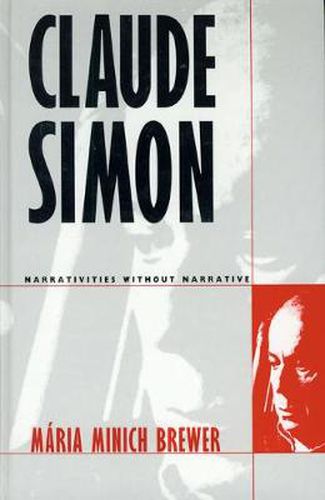Readings Newsletter
Become a Readings Member to make your shopping experience even easier.
Sign in or sign up for free!
You’re not far away from qualifying for FREE standard shipping within Australia
You’ve qualified for FREE standard shipping within Australia
The cart is loading…






A provocative critical performance…Elegant, concise, and dynamic. –Dina Sherzer, author of Representation in Contemporary French Fiction The scholarship in this manuscript is impeccable. The author knows her subject thoroughly and has a vast and impressive command of literary theory. –Dorish Kadish, author of Practices of the New Novel. Reputed to be a conservative group, the Nobel Prize committee astonished the world in 1985 by giving its prize to Claude Simon, one of the most adventurous and challenging of modern authors whose writing defies easy classification. This study shows exactly how inventive and challenging he is. Simon’s works run the gamut from first-person narratives to narratives without a stable perspective. His novels deal with minute details of the grand stages of history–world war, for instance–and with the historical dimensions of everyday life. Maria Minich Brewer demonstrates that Simon has reformulated the standard forms of fiction to expose the logic of narrative, a complex and powerful legacy populated with stereotypes too easily accepted as natural.Her book brings into focus the cultural legacies embedded in narrative as well as the narrative dimensions of culture and history. Simon has voiced suspicion of narrative order. He never underestimates, however, either its pervasiveness or its powers. In his novels, he never dismisses narrative order as being merely a matter of formal conventions. On the contrary, he reveals narrative representation to be a powerful agent of some of the most violent events to which an individual is subject. Maria Minich Brewer is an associate professor in the Department of French and Italian at the University of Minnesota. Her articles and essays have appeared in Boundary 2, MLN, The Romanic Review, Stanford French Review, and many other journals.
$9.00 standard shipping within Australia
FREE standard shipping within Australia for orders over $100.00
Express & International shipping calculated at checkout
A provocative critical performance…Elegant, concise, and dynamic. –Dina Sherzer, author of Representation in Contemporary French Fiction The scholarship in this manuscript is impeccable. The author knows her subject thoroughly and has a vast and impressive command of literary theory. –Dorish Kadish, author of Practices of the New Novel. Reputed to be a conservative group, the Nobel Prize committee astonished the world in 1985 by giving its prize to Claude Simon, one of the most adventurous and challenging of modern authors whose writing defies easy classification. This study shows exactly how inventive and challenging he is. Simon’s works run the gamut from first-person narratives to narratives without a stable perspective. His novels deal with minute details of the grand stages of history–world war, for instance–and with the historical dimensions of everyday life. Maria Minich Brewer demonstrates that Simon has reformulated the standard forms of fiction to expose the logic of narrative, a complex and powerful legacy populated with stereotypes too easily accepted as natural.Her book brings into focus the cultural legacies embedded in narrative as well as the narrative dimensions of culture and history. Simon has voiced suspicion of narrative order. He never underestimates, however, either its pervasiveness or its powers. In his novels, he never dismisses narrative order as being merely a matter of formal conventions. On the contrary, he reveals narrative representation to be a powerful agent of some of the most violent events to which an individual is subject. Maria Minich Brewer is an associate professor in the Department of French and Italian at the University of Minnesota. Her articles and essays have appeared in Boundary 2, MLN, The Romanic Review, Stanford French Review, and many other journals.